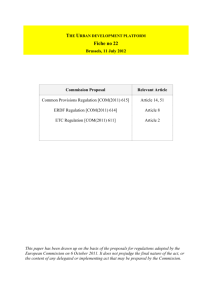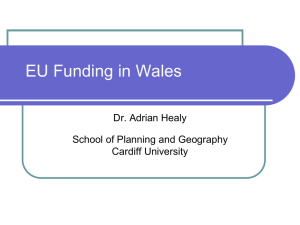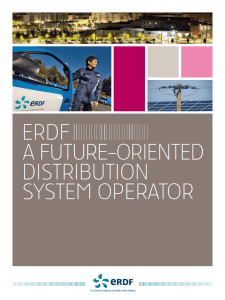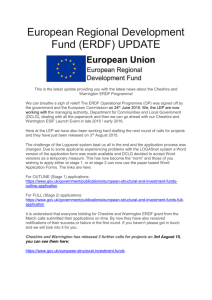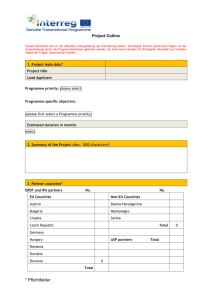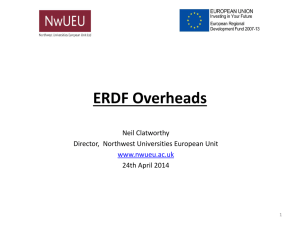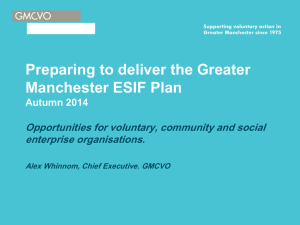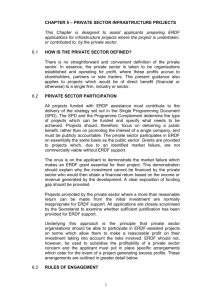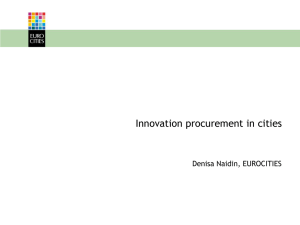DOC - Europa
advertisement
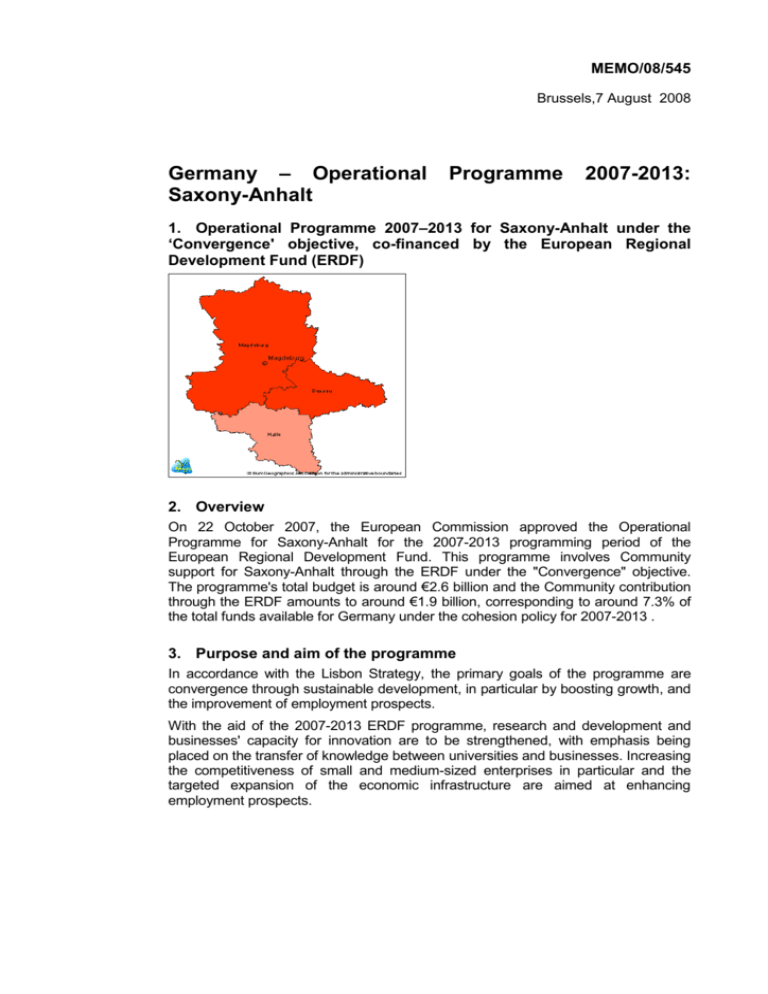
MEMO/08/545 Brussels,7 August 2008 Germany – Operational Saxony-Anhalt Programme 2007-2013: 1. Operational Programme 2007–2013 for Saxony-Anhalt under the ‘Convergence' objective, co-financed by the European Regional Development Fund (ERDF) 2. Overview On 22 October 2007, the European Commission approved the Operational Programme for Saxony-Anhalt for the 2007-2013 programming period of the European Regional Development Fund. This programme involves Community support for Saxony-Anhalt through the ERDF under the "Convergence" objective. The programme's total budget is around €2.6 billion and the Community contribution through the ERDF amounts to around €1.9 billion, corresponding to around 7.3% of the total funds available for Germany under the cohesion policy for 2007-2013 . 3. Purpose and aim of the programme In accordance with the Lisbon Strategy, the primary goals of the programme are convergence through sustainable development, in particular by boosting growth, and the improvement of employment prospects. With the aid of the 2007-2013 ERDF programme, research and development and businesses' capacity for innovation are to be strengthened, with emphasis being placed on the transfer of knowledge between universities and businesses. Increasing the competitiveness of small and medium-sized enterprises in particular and the targeted expansion of the economic infrastructure are aimed at enhancing employment prospects. Urban projects aimed at contributing to enhancing potential for economic development and combating social and ecological degradation are planned. At the same time, investment in educational and social infrastructures is intended to contribute to integrated urban development. Finally, investment in certain infrastructures is designed to boost environmental protection and increase risk prevention. Special attention is to be given to equal opportunities and to the challenges presented by demographic change when implementing all these measures. 4. Expected impact of the investments Over 400 projects promoting innovation and around 370 research and development projects are to be implemented under the programme, resulting in the funding of 600 research posts, inter alia. There are over 1 000 projects promoting direct investment, creating almost 59 000 jobs, and approximately 4 500 projects for advising small and medium-sized enterprises in particular. Around 260 projects with an investment volume of just under €280 million are planned for the expansion of the economic infrastructure. Through the 155 planned urban measures, €560 million is to be used to fund urban renovation and invested in the modernisation of schools which demonstrate improved teaching strategies. At the same time, a wide range of projects concerning the rational use of energy and the use of renewable energy sources are to be supported. Overall, it is expected that this support will result in an annual increase of SaxonyAnhalt's GDP by 0.7-1.0% and a rise of 8 000 people per year in gainful employment. 5. Priorities In order to achieve the main objectives of the programme, the ERDF Operational Programme 2007-2013 for Saxony-Anhalt has been divided into the following priorities: Priority 1: Innovation, research and development [approx. 25.6% of total ERDF funding] The primary aim of this priority is to strengthen Saxony-Anhalt as a location for research and development in a sustainable manner. A first aspect encompasses subsidies for small and medium-sized enterprises for industrial research and development, the introduction of new production processes, the transfer of technology, and also the provision of risk capital. A second aspect concerns support for publicly financed research within and outside universities and funding infrastructure projects in higher education. A third aspect is aimed at increasing the innovative capacity of the economy through transfer of knowledge and technology and network measures. Finally, projects on the development and use of renewable energy sources and climate protection will be supported. Priority 2: Increasing the competitiveness of the economy [approx. 33% of total ERDF funding] This priority focuses on the promotion of business investment with a view to widening the Land's export base. In addition, two loan and co-financing instruments are to be made available in response to specific funding problems encountered by new small and medium-sized enterprises. Furthermore, complementary and specific measures for the support of SMEs are planned, comprising, above all, advisory services and other forms of support aimed at ensuring competitiveness. 2 Priority 3: Improving the economic infrastructure [approx. 13.4% of total ERDF funding] This priority calls for investment in economic infrastructure, in order to guarantee the establishment and growth of companies, remove key bottlenecks in the transport infrastructure and better develop endogenous potential. In the area of economic infrastructure, the quality of as yet unoccupied industrial sites is to be improved and abandoned industrial sites regenerated as required. Selected investments in the economic infrastructure are planned, in order to offset disadvantages of location and improve certain areas' links to national transport networks. Furthermore, projects for developing tourism through the qualitative improvement of the economic infrastructure in the area of culture and supporting the cultural economy will be implemented. Priority 4: Sustainable urban development, including infrastructures [approx. 13.6% of total ERDF funding] educational This priority aims to promote predominantly urban infrastructures serving to raise the profile of towns and to increase the human resources available to them and the Land, and consists of two approaches. The first of these involves promoting integrated urban development in 20 to 25 towns to improve their potential for economic development and to tackle social and ecological problems in urban areas. The second approach involves supporting projects to improve the infrastructure of pre-schools and schools, with particular emphasis on pedagogical approaches to improving the quality of education in schools. Finally, innovative solutions for social and cultural infrastructures will be supported, including those intended to address the consequences of demographic change. Priority 5: Environmental protection and risk prevention [approx. 10.4% of total ERDF funding] This priority sets out a series of measures to improve water quality and economic conditions in the area of drinking water and sewage treatment plants. As regards waste management, waste prevention and waste recovery and also environmentally friendly treatment and disposal of waste are to be given particular attention. In addition, clean urban transport projects will be carried out. Flood protection projects are also planned. Finally, measures relating to the restoration of mines and redevelopment of fallow land and conversion areas are to be promoted. Priority 6: Technical assistance [approx. 4% of total ERDF funding] Resources are also earmarked for technical assistance to implement the programme. Preparation, administration, support, assessment, information and monitoring measures for the operational programme will be supported. 6. Managing authority: Saxony-Anhalt Ministry of Finance (Ministerium der Finanzen des Landes Sachsen-Anhalt) – Magdeburg, Germany Contact details: Ministerium der Finanzen des Landes Sachsen-Anhalt, EU-VB Dr Heller Editharing 40 D-39108 Magdeburg Germany Tel.: +49 391 567 1080 Fax: +49 391 567 3080 3 E-mail: norbert.heller@mf.sachsen-anhalt.de Internet: http://www.sachsen-anhalt.de/LPSA/index.php?id=5268 7. Title: "ERDF Operational Programme 2007-2013 for Saxony-Anhalt" Intervention type: Operational Programme CCI No: 2007DE161PO007 Commission Decision No: K/2007/5254 Date of approval: 22/10/2007 8. Breakdown of funding by priority (in euro) National public contribution Total funding 491 198 001 169 214 348 660 412 349 642 344 635 219 288 713 861 633 348 3. Economic infrastructure 258 279 587 88 538 572 346 818 159 4. Sustainable urban development, including educational infrastructures 262 687 980 91 199 368 353 887 348 5. Environmental protection and risk prevention 200 010 360 72 310 950 272 321 310 77 271 690 25 757 230 103 028 920 1 931 792 253 666 309 181 2 598 101 434 Priority 1. Innovation, research and development 2. Increasing the competitiveness of the economy 6. Technical assistance Total EU contribution 4
